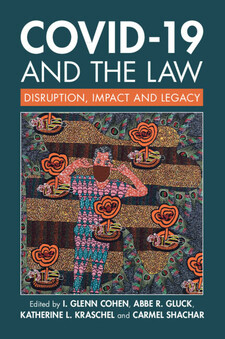Experts Discuss Legal Legacy of COVID-19 at Book Launch

It has been four years since COVID-19 was declared a public health emergency in the United States, and the pandemic continues to have a lasting impact on both individuals and organizations across the country. As we stop to reflect on the ways in which COVID-19 has changed America and the world, one question looms large: What is the pandemic’s legacy?

On Feb. 5, the Solomon Center for Health Law and Policy and the Harvard Law Petrie-Flom Center hosted a virtual event to launch the book COVID-19 and the Law: Disruption, Impact and Legacy, which addresses this very question. The event included a panel discussion featuring the book’s contributors and editors.
WATCH VIDEO: COVID-19 and the Law panel4
The impacts of COVID-19 that the book explores were well represented at the webinar — panelists’ discussion featured analysis of federalism, reproductive justice, biomedical ethics, and the Affordable Care Act, among other topics.
Dr. Ashish Jha, the Dean of Brown University School of Public Health who was appointed as the White House COVID-19 Response Coordinator in 2022, began the conversation. Jha noted that, a few years into the pandemic, many people have begun to develop “collective amnesia” regarding the devastating consequences of COVID-19. This trend, which may have resulted from a desire to return to the so-called “normal,” posed a challenge from the perspective of public health, Jha said.
Jha also stressed the difficulty of coordinating a “single coherent response” from the federal government, especially after a moment of broad uncertainty about the future of COVID-19 following the 2021-22 Omicron wave. Reflecting on the U.S.’s public health system pre-2020, Jha pinpointed the biggest weaknesses as a surveillance system that was lacking and the limited ability to ramp up diagnostic testing. Jha emphasized the importance of strengthening these systems and training future public health practitioners to work effectively in all political environments.
Kimberly Mutcherson, Professor of Law at Rutgers Law School, unpacked the impacts of COVID-19 on reproductive justice. On some issues, Mutcherson noted, COVID-19 propelled necessary changes, such as the inclusion of medication abortion in telemedicine services during COVID-19 — a success in expanding access. Despite some positive developments, however, the momentum from the pandemic didn’t carry the reproductive justice movement forward, Mutcherson said.
“As we moved out of the pandemic, rather than taking positive lessons and entrenching them, we moved backwards,” she noted.
I. Glenn Cohen, Ames A. Attwood and Leslie Williams Professor of Law and Deputy Dean at Harvard Law School, shared some of Mutcherson’s sentiments.
“We are in a worse position for the next pandemic than we were before the last,” said Cohen, Faculty Director of Harvard’s Petrie-Flom Center for Health Law Policy, Biotechnology & Bioethics.
Cohen then spoke about the unanswered ethical dilemmas highlighted during COVID-19: What do we do with scarce resources when there is a high demand? This question played out in the form of waiting lists and prioritization for vaccine distribution in states and localities, as well as ventilator allocation in hospitals. COVID-19 highlighted these same issues on the global stage, Cohen said, as countries largely vaccinated their own citizens before turning beyond their borders.
Solomon Center Faculty Director Abbe Gluck ’00 similarly noted the fade in momentum for policy change. She called the Affordable Care Act the “unsung hero” of the pandemic. But Gluck, the Alfred M. Rankin Professor of Law, also noted litigation against the ACA post-pandemic. These include a challenge to the specific provision that made the COVID-19 vaccine free and accessible to all Americans.
Beyond the ACA, Gluck noted, the pandemic triggered a series of legal challenges to federal agencies’ actions, including actions taken by the Center for Disease Control and Prevention and the Occupational Safety and Health Administration. These legal proceedings, Gluck explained, are part of a broader attempt to challenge the government's reliance on expertise in decision making, which manifests in a number of cases heard by the Supreme Court this term.
The event ended as panelists described key takeaways from COVID-19, emphasizing that it would be a mistake to ignore the lessons learned during the past four years.


